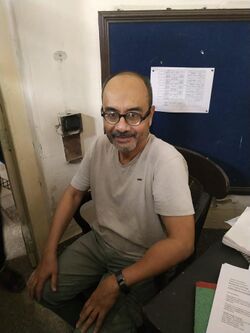
Video Upload Options
1. Introduction
Ashoke Sen, FRS (/əˈʃoʊk sɛn/; born 1956) is an Indian theoretical physicist and distinguished professor at the Harish-Chandra Research Institute, Allahabad.[1] He is also an honorary fellow in National Institute of Science Education and Research (NISER), Bhubaneswar, India [2] and also a Morningstar Visiting professor at MIT and a distinguished professor at the Korea Institute for Advanced Study. His main area of work is string theory. He was among the first recipients of the Fundamental Physics Prize "for opening the path to the realisation that all string theories are different limits of the same underlying theory"[3].
2. Early Life
He was born on 15 July 1956[4] in Kolkata, and is the elder son of Anil Kumar Sen, a former professor of physics at the Scottish Church College, and Gouri Sen, a homemaker.[5]
After completing his schooling from Sailendra Sircar Vidyalaya in Kolkata, he earned his Bachelor of Science degree in 1975 from the Presidency College under the University of Calcutta, and his master's a year later from the Indian Institute of Technology Kanpur. During his undergraduate studies at Presidency, he was greatly inspired by the work and teaching of Amal Kumar Raychaudhuri. He did his doctoral work in physics at Stony Brook University.
3. Career
Ashoke Sen made a number of major original contributions to the subject of string theory, including his landmark paper on strong-weak coupling duality or S-duality,[6] which was influential in changing the course of research in the field. He pioneered the study of unstable D-branes and made the famous Sen conjecture about open string tachyon condensation on such branes.[7] His description of rolling tachyons[8] has been influential in string cosmology. He has also co-authored many important papers on string field theory.
In 1998 he won the fellowship of the Royal Society on being nominated by the theoretical physicist Stephen Hawking.[1] His contributions include the entropy function formalism for extremal black holes and its applications to attractors. His recent important works include the attractor mechanism and the precision counting of microstates of black holes, and new developments in string perturbation theory. He joined the National Institute of Science Education and Research (NISER), Bhubaneswar, India as an honorary fellow.[9]
4. Honors and Awards
- ICTP Prize in 1989[10]
- Fellow of the Indian Academy of Sciences in 1991[4]
- S.S. Bhatnagar award in 1994
- TWAS Prize 1997[11]
- Fellow of the Royal Society 1998[1]
- Fellow of the Indian National Science Academy in 1996[12]
- Padma Shri in 2001[13]
- Infosys Prize in the Mathematical Sciences, 2009[14]
- Doctor of Science (Honoris Causa), 2009, awarded by IIT Kharagpur[15]
- Doctor of Science (Honoris Causa), 2011, awarded by Bengal Engineering and Science University, Shibpur (Presently Indian Institute of Engineering Science and Technology, Shibpur )[16]
- Fundamental Physics Prize, 2012, for his work on string theory[3][17][18]
- Padma Bhushan in 2013[19]
- M.P. Birla Memorial Award in 2013
- Doctor of Science (Honoris Causa), 2013, awarded by Indian Institute of Technology Bombay [20]
- Doctor of Letters (honorary), 2013, awarded by Jadavpur University
- Dirac Medal in 2014[21]
References
- Pulakkat, Hari (19 December 2013). "How many of us know about Breakthrough Prize winner, Ashoke Sen?". The Economic Times. https://economictimes.indiatimes.com/opinion/et-commentary/how-many-of-us-know-about-breakthrough-prize-winner-ashoke-sen/articleshow/27612815.cms. Retrieved 4 September 2019.
- "School of Physical Sciences". National Institute of Science Education and Research. https://www.niser.ac.in/sps/page/faculty. Retrieved 4 September 2019.
- "Fundamental Physics Breakthrough Prize". https://breakthroughprize.org/Laureates/1/L8.
- "Fellow Profile — Sen, Prof. Ashoke". Bangalore: Indian Academy of Sciences. http://www.ias.ac.in/describe/fellow/Sen,_Prof._Ashoke. Retrieved 23 January 2016.
- Miudur, G.S. (2 August 2012). "Physicist with pillow power". https://www.telegraphindia.com/india/physicist-with-pillow-power/cid/389848. Retrieved 4 September 2019.
- Sen, Ashoke (1994). "Dyon — monopole bound states, selfdual harmonic forms on the multi — monopole moduli space, and SL(2,Z) invariance in string theory". Phys. Lett. B329: 217–221. doi:10.1016/0370-2693(94)90763-3. Bibcode: 1994PhLB..329..217S. https://dx.doi.org/10.1016%2F0370-2693%2894%2990763-3
- Sen, Ashoke (1998). "Tachyon condensation on the brane antibrane system". JHEP 1998 (8): 012. doi:10.1088/1126-6708/1998/08/012. Bibcode: 1998JHEP...08..012S. https://dx.doi.org/10.1088%2F1126-6708%2F1998%2F08%2F012
- Sen, Ashoke (2002). "Rolling Tachyon". JHEP 2002 (4): 048. doi:10.1088/1126-6708/2002/04/048. Bibcode: 2002JHEP...04..048S. https://dx.doi.org/10.1088%2F1126-6708%2F2002%2F04%2F048
- "School of Physical Sciences". National Institute of Science Education and Research. https://www.niser.ac.in/sps/page/faculty. Retrieved 4 September 2019.
- "ICTP Prize Winner 1989". https://www.ictp.it/about-ictp/prizes-awards/the-ictp-prize/the-prize-winners/ictp-prize-winner-1989.aspx. Retrieved 4 September 2019.
- "Prizes and Awards". The World Academy of Sciences. https://twas.org/recipients-twas-awards-and-prizes. Retrieved 4 September 2019.
- The Year Book 2014 // Indian National Science Academy, New Delhi.
- "Padma Awards". Ministry of Home Affairs, Government of India. Archived from the original on 15 October 2015. https://web.archive.org/web/20151015193758/http://mha.nic.in/sites/upload_files/mha/files/LST-PDAWD-2013.pdf. Retrieved 21 July 2015.
- Infosys Prize 2009 Mathematical Sciences http://www.infosys-science-foundation.com/prize/laureates/2009/ashoke-sen.asp
- http://www.iitkgp.ac.in/institute/index.php?page=honors
- http://www.iiests.ac.in/universitygallerymenuitem/category/35-ashokesenintheceremonyofhandingoverdsc-gallery
- "New annual US$3 million Fundamental Physics Prize recognizes transformative advances in the field". Breakthrough Prize. 31 July 2012. https://breakthroughprize.org/News/15. Retrieved 4 September 2019.
- "Indian scientist Ashoke Sen bags top physics honour". The Times of India. 2 August 2012. http://economictimes.indiatimes.com/news/politics/nation/indian-scientist-ashoke-sen-bags-top-physics-honour/articleshow/15322177.cms. Retrieved 4 September 2019.
- "Rajesh Khanna, Sridevi, Mary Kom, Rahul Dravid on Padma list". The Times of India. TNN. 26 January 2013. http://articles.timesofindia.indiatimes.com/2013-01-26/india/36563644_1_s-haider-raza-padma-awards-padma-vibhushan.
- "IIT Bombay's fifty first convocation". Embide. 14 August 2013. https://www.embibe.com/exams/iit-bombays-fifty-first-convocation/undefined. Retrieved 4 September 2019.
- "Dirac Medallists 2014". https://www.ictp.it/about-ictp/prizes-awards/the-dirac-medal/the-medallists/dirac-medallists-2014.aspx.

Location: Kolkata, West Bengal, India




